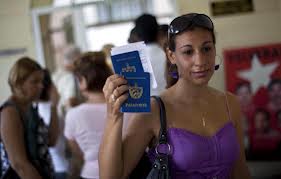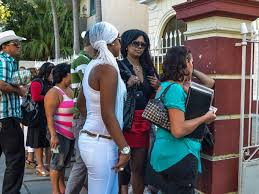Las cubanas quieren tener hijos, pero no en Cuba
La emigración cubana es cada vez más femenina. En 2012, de las 46.662 personas que se fueron del país un 52 por ciento eran mujeres.
Luego de visitar dos veces a su padre y hermano en Estados Unidos, gracias al pasaporte español que obtuvo en 2009, la cubana Sissy Ramos decidió unírseles definitivamente, aunque con ello siga postergando su anhelo de maternidad, reporta IPS.
Ser mujer y joven son dos características de la emigración cubana actual, lo que deja a la Isla de casi 11,2 millones de habitantes con una población cada vez más envejecida y que pierde parte de sus generaciones de relevo.
Antes de tomar un avión a Islas Caimán y luego a Estados Unidos, donde se acogió a la Ley de Ajuste que desde 1961 facilita la residencia de cubanos que toquen su territorio, esta ingeniera de programación de 27 años abrazó a su madre y a su novio con la esperanza de reencontrarlos pronto.
“Parto primero para ir ahorrando hasta que aparezca la vía de que él salga. Queríamos casarnos y tener hijos después de graduarnos, pero sin vivienda propia y con salarios de 365 pesos (13 dólares) mensuales, que no permiten mantenernos, es preferible que nazcan en otro país”, dijo a IPS días antes de su partida.
“Aquí nací, me crié, tengo amistades y están mi madre y padrastro, con más de 60 años. No quisiera irme, pero para tener un futuro mejor y garantizar el de mi descendencia no puedo quedarme en Cuba”, añadió.
“Allá pienso trabajar en desarrollo de programas computacionales, que se paga bien y tiene demanda. Así poco a poco podré llevarme al resto de la familia”, dijo.
Emigración cada vez más femenina
Como en el resto del mundo en desarrollo, la emigración de Cuba es cada vez más femenina.
En 2012, de las 46.662 personas que se fueron, un 52 por ciento eran mujeres. A su vez, los grupos de edades con más emigrantes van de 20 a 40 años, una tendencia que se mantiene, según Antonio Aja, director del Centro de Estudios Demográficos de la Universidad de La Habana.
Becas académicas, contratos laborales, matrimonios con extranjeros, reunificación familiar o visitas personales de las que no se regresa son algunas de las vías utilizadas para irse a vivir al exterior.
Actualmente 44,9 por ciento de las familias cubanas tienen jefatura femenina, al ser ellas las que más aportan al hogar, así tengan pareja. A ello se suma que las mujeres representan 64 por ciento de los profesionales universitarios, explicó a IPS la socióloga Marta Núñez.
“La mayoría prefieren emigrar solas y representan la principal fuente de ingresos para sí mismas y para sus familias, a las que casi siempre envían remesas”, destacó esta profesora de la Universidad de La Habana entre los resultados de una investigación sobre la migración de 2009.
El 18,3 por ciento de los habitantes de Cuba tienen 60 años o más, un punto porcentual más que el segmento menor de 14 años. En 2012 nacieron 11,3 personas por cada 1.000 habitantes, 1,5 menos que en 2011. La fecundidad de la Isla es la más baja de América Latina: menos de dos hijos por mujer, según datos del Censo de Población y Viviendas 2012.
Durante el último quinquenio emigraron unas 39.000 personas por año, el mayor promedio desde los primeros años de la Revolución, iniciada en 1959.
Los motivos de la gran emigración van desde la búsqueda de una mejora económica y vital, con nuevos espacios laborales e ingresos, hasta la reunificación familiar, dijo Aja.
También se nutre del rechazo a la forma de vida impuesta por el Gobierno cubano. “Llamar al emigrante cubano un caso político es incorrecto, pero tampoco es netamente económico”, opinó el especialista.
Hay nacidos en Cuba en más de 150 países, la mayoría en Estados Unidos, donde el último censo de población reportó alrededor de 1,8 millones de personas originarias de la Isla, el 50,8 por ciento mujeres.
Habría que tomar medidas que favorezcan el interés de mujeres y hombres jóvenes en proyectar su futuro y descendencia en Cuba, dijeron a IPS varias fuentes.
En los 10 primeros meses de 2013, tras entrar en vigor de la reforma migratoria que eliminó el permiso de salida, viajaron al exterior 184.787 personas. De los 66.510 que fueron a Estados Unidos, el 60 por ciento no ha regresado aún, según dijo a Cuba Hoy Lamberto Fraga, de la Dirección de Inmigración y Extranjería.
DDC/Agencies/Excerpts/InternetPhotos/thecubanhistory.com
LAS CUBANAS quieren tener hijos, pero no en Cuba
The Cuban History, Hollywood.
Arnoldo Varona, Editor
Cuban want children , but not in Cuba
Cuban migration is increasingly female . In 2012 , of the 46,662 people who left the country 52 percent were women.
After visiting twice his father and brother in the United States, thanks to the Spanish passport he obtained in 2009 , the Cuban Sissy Ramos finally decided to join them , though it your desire to continue postponing motherhood, reported IPS .
Being female and young are two features of the current Cuban emigration , leaving the island nearly 11.2 million people with an increasingly aging population and loses some of its generations of relief .
Before taking a plane to Cayman Islands and then to America , where he hosted the Adjustment Act in 1961 facilitated the residence of Cubans who touch their territory , this engineering program 27 years embraced his mother and her boyfriend hoping to meet you again soon.
” Childbirth first saving up to go to the track he leaves appear. Wanted to get married and have children after we graduated , but homeownership and wages of 365 pesos ( $ 13 ) a month , which does not allow keep , it is preferable to be born in another country, “he told IPS days before departure .
” Here I was born , grew up, have friends and are my mother and stepfather, with more than 60 years. Would not go, but to have a better future and ensure my descent I can not stay in Cuba ,” he added .
“There I work on developing computer programs that pays well and is in demand. Slowly So I can take the rest of the family,” he said.
Increasingly female emigration
As in the rest of the developing world , migration of Cuba is increasingly female .
In 2012 , of the 46,662 people who left, 52 percent were women. In turn, the age groups most migrants are from 20 to 40 years, a trend that remains , according to Antonio Aja , director of the Center for Demographic Studies at the University of Havana.
Academic scholarships , employment contracts, foreign marriages , family reunification or personal visits for which no returns are some of the ways used to go and live abroad.
Currently 44.9 percent of Cuban families are headed by women , to be the ones who bring home more and have a couple . Added to this is that women represent 64 percent of university graduates , told IPS sociologist Marta Núñez .
“Most prefer to migrate alone and represent the main source of income for themselves and their families , which almost always send remittances ,” said the professor at the University of Havana between the results of research on migration , 2009 .
18.3 percent of people in Cuba are 60 years or more, a percentage point higher than the lower segment 14. People born in 2012 11.3 per 1,000 population , 1.5 less than in 2011 . The fertility of the island is the lowest in Latin America: less than two children per woman , according to the Census of Population and Housing 2012.
During the last five years they migrated some 39,000 people per year, the highest average since the early years of the Revolution, began in 1959.
The reasons for the great migration ranging from search and vital economic improvement, with new work and income spaces, to family reunification, Aja said.
It also draws the rejection of the lifestyle imposed by the Cuban government. ” Call the Cuban immigrant political case is wrong, but is not purely economic ,” said the specialist.
There born in Cuba in more than 150 countries, mostly in the U.S., where the last census reported about 1.8 million people from the island , 50.8 percent female.
We should take measures to encourage the interest of young women and men project their future offspring in Cuba , several sources told IPS .
In the first 10 months of 2013 , after entering into force of the immigration reform that eliminated the exit permit , 184,787 people traveled abroad . Of the 66,510 who went to the United States , 60 percent have not yet returned , he told Today Cuba Lamberto Fraga, of the Immigration and Nationality.
DDC / Agencies / Excerpts / InternetPhotos / thecubanhistory.com
CUBAN want children , but not in Cuba
The Cuban History , Hollywood.
Arnoldo Varona , Editor



 © CUBAN WOMEN want children, but not in Cuba (Photos) * * LAS CUBANAS quieren tener hijos, pero no en Cuba (Fotos).
© CUBAN WOMEN want children, but not in Cuba (Photos) * * LAS CUBANAS quieren tener hijos, pero no en Cuba (Fotos).


